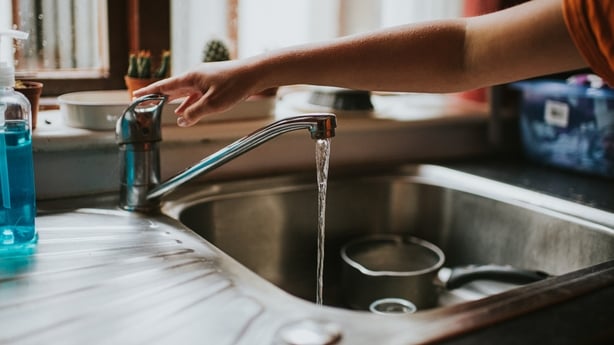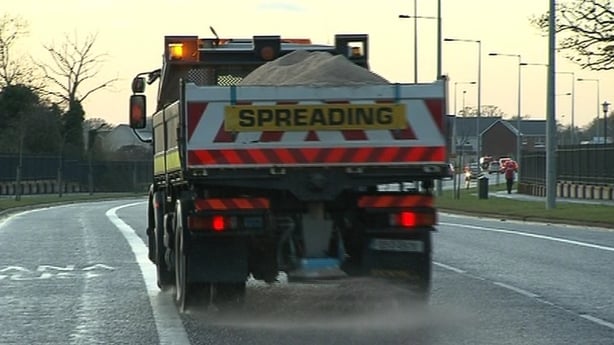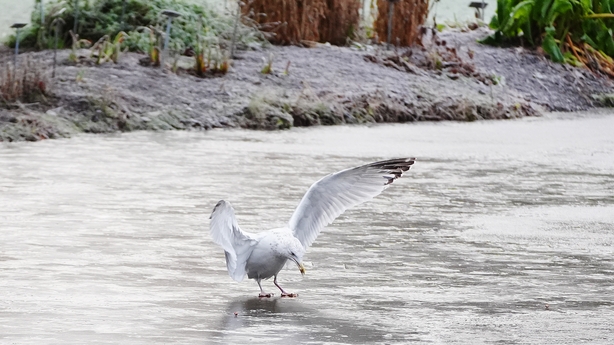As temperatures begin to slowly creep up again, many people will still be feeling the effects of the recent cold snap.
Met Éireann have said that temperatures are expected to rise as a Status Yellow snow and ice weather warning for the entire country has been lifted.
However burst pipes and difficult driving conditions are expected as the thaw begins to set in.
There are a number of ways to combat some of the lasting effects of the recent freeze.
Burst pipes
If pipes freeze, they can then crack and burst once they heat up again.
Uisce Éireann recommend taking action as soon as possible if you find a burst pipe in your home.
If you have a burst pipe, turn off the water supply and drain your water system by flushing toilets and turning on cold taps.
Switch off your immersion and central heating and let all solid fuel heating die out if in use.
Once the heating system is off, run hot taps to further drain your water system.

If the water is leaking near any sockets, turn off the mains but only if it is safe to do so. If you discover a wet socket, call a qualified electrician to examine it. Do not touch it yourself.
Check in with your neighbours, particularly in shared accommodation spaces such as an apartment complex.
Make sure you have access to the stopcock, which is usually found where the water supply enters the building.
Ensure your efforts to turn off your supply do not impact your neighbours.
High volume of frozen pipes in Cork
Sean Richardson of Complete Plumbing Solutions in Cork says that there's currently a high volume of disruption in the area.
Speaking on RTÉ’s News at One, he said that using a hair dryer or bar heater to thaw the pipes may be the best course of action.
"A good solution there might be if you have a bar heater or something that wouldn’t cause a fire hazard. Alternatively a hair dryer might be a good solution," he said.
"Usually it’s the pipe that’s going into the top right of your tank that’s going to be frozen, if you could thaw that out with a hairdryer, a bar heater or something similar like that, there’s a good chance that that could get you going," he added.
Repairing a burst pipe
You can carry out a temporary repair on a burst pipe yourself by binding it tightly with cloth or tape.
However, it is recommended to get it replaced as soon as possible by a qualified and registered plumber.
When the pipe is repaired, make sure your hot water supply is refilled before switching your boiler or immersion back on.
Difficult driving conditions
While the ice and snow bring their own challenges, a thaw in conditions can make things difficult for road users in different ways.
A number of roads may be damaged as a result of the snow and ice. This may lead to potholes and black ice in some areas.
Give plenty of space to drivers, cyclists and motorcyclists to allow for avoiding potholes or other damaged areas of the road.
Black ice may linger on bends and sheltered areas of roads.
Grit residue that remains on roads may lead to cars skidding, particularly on bends and in the middle of roads where grit tends to build up.

Reduced visibility may also be an issue as spray from other vehicles splashes up on windscreens. It is recommended to keep your windscreen washer topped up, make sure your lights are clear of grime and dirt and stay well back from other vehicles, particularly goods vehicles.
Overhead hazards may also present themselves as snow and ice begins to melt. Road users, in particular cyclists and pedestrians, are advised to be aware of their surroundings as falling snow and ice from trees and buildings can pose serious threats.
Vehicles can get damaged as splatters of slush, sand, grit and other ice-melting chemicals may cause corrosion. Keep your vehicle as clean as possible, particularly the windscreen and lights. It is recommended to power wash or spray the wheel arches to keep corrosion at a minimum.
As always, drivers are asked to slow down and expect the unexpected.
The Road Safety Authority have provided a useful guide for road users to cope with severe weather conditions, which is available to download on their website.
Avoid walking on ice
Despite an expected rise in temperatures, thin ice still remains a danger.
Water Safety Ireland have issued a warning to walkers, asking them to avoid standing on ice at lakes, rivers and canals, saying that "there is no such thing as safe ice".
Partly frozen lakes, canals, and rivers may appear solid, but ice thickness can vary significantly due to currents, temperature changes, and other environmental factors.
Parents are advised to teach children about the dangers of ice and supervise them closely when near frozen bodies of water.

Pets should also be kept on a tight lead, and owners are asked not to throw sticks or toys for them to chase on to frozen surfaces.
If someone should fall through ice, call emergency numbers 999 or 112 immediately.
Do not try to rescue them, as you will be at risk of falling through the ice yourself.
Use items such as lifebuoys or long poles and sticks to try and extend your reach.
Keep the casualty reassured until help arrives.
"Slow and gradual" thaw expected
Alan O'Reilly of Carlow Weather said the thaw will be "slow and gradual", especially in areas with deep snow.
Speaking on RTÉ's Today with Claire Byrne, he said warmer air is trying to come up, but it is going to be a slow process.
"We don't want a quick thaw... because we would have flooding problems with the amount of snow, especially in the areas that are worst impacted," he said.
He said by Sunday, temperatures should be back up in the double digits as the thaw speeds up, and by Tuesday, it might hit 14 degrees.
Watch: Sheep rescued after being trapped under snow on Galtee mountains







